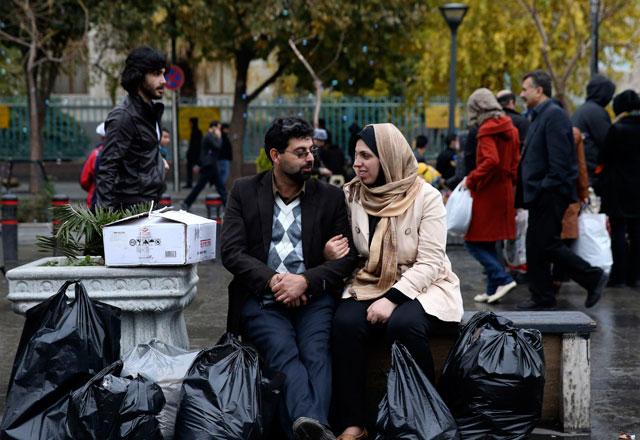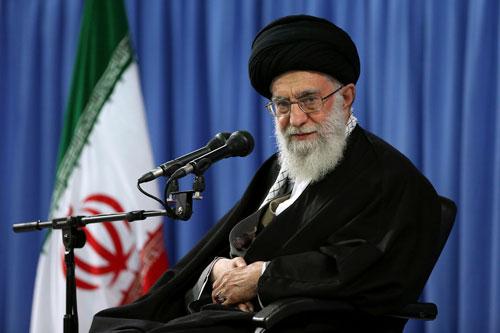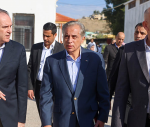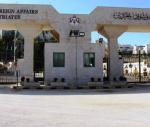You are here
Iran’s Rouhani squeezed over nuclear talks extension
By AFP - Nov 25,2014 - Last updated at Nov 25,2014

TEHRAN — Iran President Hassan Rouhani faced thinly veiled pressure Tuesday over a missed nuclear deal deadline and an unexpected seven-month extension of talks with hardliners denouncing the diplomatic deadlock.
The failure to clinch a final agreement with world powers dominated newspaper front pages, with many editorials viewing further dialogue as pointless because the talks have not yet yielded results.
The extension was debated in parliament where the judgement of Rouhani, who told the nation late Monday a deal would still be done despite the setback, was also scrutinised.
Lawmakers have consistently said the president and his negotiators have already made too many concessions over Iran’s disputed nuclear programme, a sentiment aired again in a tense parliamentary session.
Hamid Rasaie, a diehard conservative MP, said that while a final agreement would be a victory for Iran, Rouhani must resist pressure for a deal whose costs are too high.
“No critic who is caring and supportive of the Islamic republic would be happy about your defeat,” he said of the possibility of no deal next year.
“Our criticism relates to your optimism towards the West,” he added.
Rouhani has become a lightning rod for opponents who routinely doubt the merit of the nuclear talks, but the decision on any final agreement rests with Supreme Leader Ayatollah Ali Khamenei.
He officially supports Rouhani’s policy, but has said several times the talks have achieved nothing, often blaming the United States and echoing the views of hardliners.
Khamenei defiant
On Tuesday, Khamenei said Iran would not sink “to its knees” on the nuclear issue, despite the efforts of “arrogants” — purportedly Western governments — to make it do so.
Iran’s archenemy Israel and many in the international community suspect Tehran of using its civilian nuclear programme as a cover for developing a nuclear bomb, a charge it strongly denies.
Khamenei’s comments, his first since the missed deadline, came in a speech he made in Tehran.
Rouhani on Monday sought to rally support for the talks, saying a deal was within reach and sanctions would be lifted “step by step” though he would never give up the nuclear programme.
“During all this time centrifuges were spinning,” he said referring to the talks and the technical process of enriching uranium, a hotly contested issue as at high purities it can produce fissile material for an atom bomb.
“I promise the Iranian nation that those centrifuges will never stop working,” Rouhani said on state television.
Those remarks were challenged by Rasaie who also criticised Rouhani for labelling his critics “illiterate” and “radical”.
“Right now, neither the centrifuges spin, nor the factories work,” the MP said. “We expected Mr Rouhani to apologise but unfortunately this didn’t happen.”
Conservative media also attacked the extension.
“Nothing” said the front page of hardline broadsheet Vatan-e-Emrooz, labelling the extra time a ruse to “cover up that negotiations in fact failed because of America’s excessive demands”.
Media split
However, Shargh, a leading reformist daily, said dialogue with the West, notably the United States, signalled “major change” for Iran and a “victory of realism, rationality and pragmatism”.
Saeed Leylaz, one of Iran’s top economists, said the $700 million per month Iran will receive in sanctions relief was a good result, equivalent to a daily increase of 300,000 barrels of oil.
“Increasing exports by that amount — about 30 per cent on present levels — would be very difficult under any other circumstances,” he said.
On Rouhani, he said: “He will continue to face pressure but he is the only one who can reach the nuclear agreement that most people want.”
A Western diplomat in Tehran said Rouhani had bought himself time with the extension: “It is neither a defeat nor a victory,” he added.
In a positive economic indicator, meanwhile, the Iranian rial did not fall Tuesday, despite fears that no final deal would hurt the currency.
When international sanctions on Iran were announced in December 2011 the rial fell precipitously.
In central Tehran, the extension was welcomed.
“These negotiations are not a simple task that can reach a result quickly,” said Hashemi, who gave only his surname.
“The beginning is positive. Hopefully, next time they can reach an agreement.”
Related Articles
Iran is serious in seeking a comprehensive nuclear deal with world powers despite lingering differences, President Hassan Rouhani said Saturday, insisting negotiations could succeed before a July 20 deadline expires.
Iran, the United States and other world powers are all but certain to miss Monday's deadline for negotiations to resolve a 12-year stand-off over Tehran's atomic ambitions, forcing them to seek an extension, sources say.
Iranian Supreme Leader Ayatollah Ali Khamenei on Thursday demanded that all sanctions on Iran be lifted at the same time as any final agreement with world powers on curbing Tehran's nuclear programme is concluded.














